Yeshua’s Hanukkah Declarations of his Identity
In the cold winter of Jerusalem, amid the Festival of Lights, Yeshua stood in Solomon’s Colonnade on the eastern side of the Temple, surrounded by curious and confrontational listeners. The setting was Hanukkah (the Feast of Dedication), the festival commemorating God’s miraculous deliverance of the Jewish people from the persecution of the evil Seleucid ruler, Antiochus IV Epiphanes, and the Temple’s rededication to God. Yeshua intentionally used this moment to reveal profound truths about His identity to His Jewish audience.
Yeshua’s Jewish disciple, Yochanan (John), captured this pivotal encounter in his account:
At that time the Feast of Dedication took place at Jerusalem. It was winter, and Yeshua was walking in the temple, in the colonnade of Solomon. So gathered around him and said to him, “How long will you keep us in suspense? If you are the Messiah, tell us plainly.”
Yeshua answered them, “I told you, and you do not believe. The works that I do in my Father’s name bear witness about me, but you do not believe because you are not among my sheep. My sheep hear my voice, and I know them, and they follow me. I give them eternal life, and they will never perish, and no one will snatch them out of my hand. My Father, who has given them to me, is greater than all, and no one is able to snatch them out of the Father’s hand. I and the Father are one.”
The Jewish leaders picked up stones again to stone him. Yeshua answered them, “I have shown you many good works from the Father; for which of them are you going to stone me?”
The Jewish leaders answered him, “It is not for a good work that we are going to stone you but for blasphemy, because you, being a man, make yourself God.” (John 10:22–33)
Here Yeshua chose the backdrop of Hanukkah to reveal two important truths of His identity: the fact He is both Messiah and God.
Messiah: The Long-Awaited Deliverer
During Yeshua’s time, Messianic expectations were high. Many Jewish people, especially the Zealots, interpreted the Jewish prophet Daniel’s prophecy about the Messiah to mean the Messiah had to arrive during their time, especially before the destruction of the Second Temple (Daniel 9:24–27; cf. Josephus, Wars 6.312). In addition, the heavy-handed Roman occupation of Israel further intensified Jewish anticipation of their deliverer. They yearned for a Messiah who would liberate them from oppression, similar to how the Maccabean revolt liberated them from the evil rule of the Seleucid Empire several hundred years earlier.
But unlike the political liberator many anticipated—a conquering king who would immediately overthrow Roman rule—Yeshua came as a humble servant to atone for Israel’s sin and bring peace between her and God, as the Jewish prophets foretold. The prophet Zechariah wrote that Israel’s Messiah would first come as a lowly servant, riding on a donkey:
“Rejoice greatly, O daughter of Zion! Shout aloud, O daughter of Jerusalem! Behold, your king is coming to you; righteous and having salvation is he, humble and mounted on a donkey” (Zechariah 9:9).
The prophet Daniel wrote that He would return in power, riding on the clouds of heaven:
“I saw in the night visions, and behold, with the clouds of heaven there came one like a son of man, and he came to the Ancient of Days and was presented before him. And to him was given dominion and glory and a kingdom” (Daniel 7:13–14).
Yeshua fulfilled the words of the prophet Zechariah as He rode into Jerusalem on a donkey, while people shouted, “Hosanna to the Son of David!” (Matthew 21:9). Later that same week, Yeshua also fulfilled the words of the prophet Isaiah, who prophesied that the Messiah would suffer and die to atone for sin at His first coming, before returning to reign as king at His second coming:
We [Isaiah’s people Israel] esteemed him stricken, smitten by God, and afflicted. But He was pierced for our transgressions; He was crushed for our iniquities; upon him was the chastisement that brought us peace, and with his sounds we are healed. All we like sheep have gone astray; we have turned—every one—to his own way; and the Lord has laid on Him the iniquity of us all (Isaiah 53:4–6).
Knowing His mission would not yet be understood, given the Messianic expectations of His day, Yeshua often instructed people not to publicly proclaim His messianic identity early in His ministry. When challenged on Hanukkah by the Jewish leaders to declare plainly whether He was the Messiah, Yeshua responded, “I told you, and you do not believe. The works that I do in my Father’s name bear witness about me, but you do not believe because you are not among my sheep” (John 10:25–26). Yeshua affirmed that He had already told them and declared by His works that He was Messiah.
Yeshua’s ministry was one marked by the works and miracles prophesied of the Messiah. He made the blind see, made the lame walk, cleansed lepers, made the deaf hear, raised the dead, and evangelized the poor, as the prophet Isaiah foretold (Isaiah 11:1–2; 29:18; 35:5–6; 61:1–2; cf. Matthew 11:4–5). Most importantly, His earthly ministry concluded with His atoning death for sin and His resurrection, likewise prophesied of the Messiah (Isaiah 52:13––53:12; Daniel 9:24–27).
At Yeshua’s Second Coming, He will fulfill the prophecies concerning Messiah’s defeat of Israel’s enemies and the Messianic age of peace (Zechariah 12:9–10; Isaiah 2:2–4; 19:23–25; Daniel 7:13–15).
God in the Flesh
The most controversial moment of Yeshua’s declarations on Hanukkah came when Jesus boldly proclaimed, “I and the Father are one” (John 10:30). His statement echoed the Shema from Deuteronomy 6:4: “Hear, O Israel: The Lord our God, the Lord is one.” By positioning Himself in this context, Yeshua was making an explicit claim to divinity that His Jewish audience immediately understood.
The Jewish leaders considered Yeshua’s declaration to be one with the Father as blasphemy and prepared to stone Him. Just as the religious leaders missed the Scripture’s description of Messiah’s mission to atone for sin, they likewise missed its description of His divine identity. The prophet Isaiah foretold that the coming Messiah would be God in the flesh:
“For to us a child is born, to us a son is given; and the government shall be upon his shoulder, and his name shall be called Wonderful Counselor, Mighty God, Everlasting Father, Prince of Peace” (Isaiah 9:6[5]).
Yeshua’s claim was particularly pointed during Hanukkah. Antiochus IV desecrated God’s temple and called himself “Epiphanes,” which literally means, “god manifest.” Yeshua presented Himself in God’s temple as the true manifest God and the Good Shepherd who came to love and save His sheep, the people of Israel.
This Hanukkah, we invite you to think about Yeshua’s claims about Himself that He made more than 2,000 years ago during this Festival of Lights. We believe the Jewish Scriptures point to the fact He is indeed who He claimed to be, Messiah and the God of Israel. Who do you say that He is?
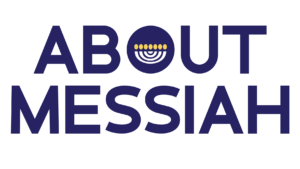
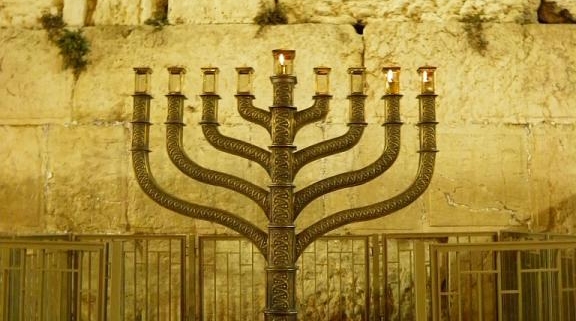
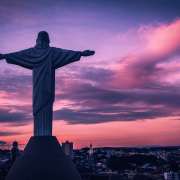
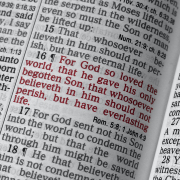
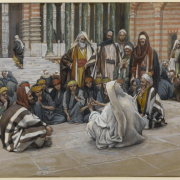 Public Domain
Public Domain


